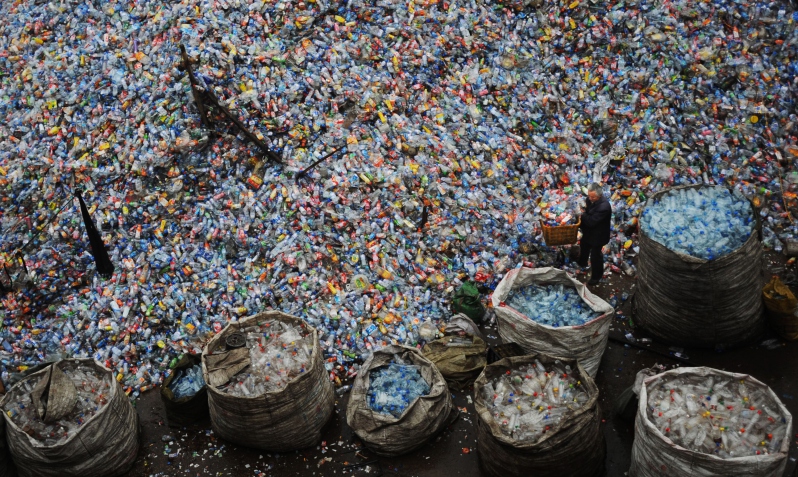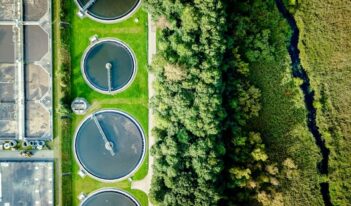
A new recycling law faces criticism from environmental groups and praise from plastics manufacturers.
Less than 9 percent of the 35.7 million tons of plastic produced in the United States in 2018 was recycled, according to the U.S. Environmental Protection Agency (EPA).
Low labor and transportation costs, as well as lax recycling standards, previously made China the destination for half of the world’s plastic waste. But in 2018, the country’s National Sword policy barred plastic importation, saddling governments around the world with plastic waste that suddenly became too expensive to recycle. Now, U.S. lawmakers are scrambling to find a destination for their waste as plastic production continues to increase.
In Pennsylvania, Governor Tom Wolf signed Act 127 into law, which went into effect in January 2021.
Act 127 introduces a simple change to Pennsylvania’s Solid Waste Management Act, which one report says could stimulate the state’s plastic recycling industry and reduce waste buildup. The Act reclassifies “advanced recycling” plants—which use high temperature and pressure to turn post-use plastics into the raw materials needed for products such as new plastic and jet fuel—as manufacturing facilities. Manufacturing facilities are less regulated than conventional waste-processing facilities, thus making it easier for advanced recycling plants to operate in the state.
The law’s proponents believe that it will encourage economic growth while reducing plastic pollution. They envision a future where the law supports such innovation in plastic recycling that plastic can be recycled endlessly, never becoming waste.
In the immediate wake of China’s trash ban, cities on the West Coast of the United States were left without an economically viable way to recycle their waste, leading waste management companies to dump plastic waste in landfills. Studies have shown this practice to be environmentally unsound. As plastic waste accumulates in landfills, it degrades into smaller particles that are then absorbed into the food chain or enter drinking water, where it can eventually be consumed by humans and interfere with their hormones. Other methods of dealing with plastic waste are similarly dangerous. Some waste management companies resorted to burning their plastic, even though EPA has linked incineration plants to increased cancer rates.
Proponents of Act 127 say that advanced recycling facilities would not emit the toxic smog and ash that conventional incinerators do, and that advanced recycling facilities release about as much carbon as a hospital or college campus.
Chemical industry trade groups such as the American Chemistry Council (ACC) estimate that Act 127 provides an economically attractive alternative that can recycle the plastics currently sent to landfills and incinerators. The ACC predicts that advanced plastics recycling will support job growth and “generate $314 million in new economic output annually” in Pennsylvania.
Advanced recycling could also alleviate recycling contamination, which frustrates conventional recycling and inflates costs. Recycling contamination occurs when consumers mix recyclable and nonrecyclable plastics, or when recyclable materials contain food residue. Advanced recycling is more tolerant of contamination, and it may allow for the recycling of previously unrecyclable plastics.
Environmental groups, however, warn that the processes used in, and materials produced by, these advanced techniques will intensify climate change. Specifically, they contend that this reclassification will deepen Pennsylvania’s reliance on single-use plastics, which fuel the advanced recycling process.
These groups also indicate the paradox between Pennsylvania’s climate goals and the effect that Act 127 will have on carbon emissions. The state plans to reduce greenhouse gas emissions by 80 percent by 2050. According to environmental groups, Act 127 also encourages the production of fossil fuels in addition to single-use plastics, since fossil fuels are needed to create the plastics needed in advanced recycling. These processes, in turn, would yield carbon-emitting transportation fuel.
The Global Alliance for Incinerator Alternatives (GAIA), an environmental advocacy group, contends that the plastic manufacturing industry supports Act 127 to distract the public from the environmental impact of plastic use. GAIA also notes that the term “advanced recycling” itself misleads the public into believing that plastic is being reused, even though most advanced recycling processes “produce fuels and not new plastic.”
Both sides leave out of the discussion, however, whether the federal government should have a greater role in regulating plastic recycling. A simple federal regulation coordinating recycling nationwide, as proposed by EPA in 2020, could mitigate plastic pollution and raise recycling rates. Such a regulation might obviate the need for a law such as Act 127.
The debate over whether advanced recycling facilities can increase recycling rates or will accelerate climate change will play out in the coming years. The motivation behind Act 127, however, is clear: It was passed in response to plastic pollution. Most Americans want to recycle, but ambiguous directions on plastic containers lead consumers to dispose of trash into the recycling bin or to place recyclable material in the trash bin. Act 127 could be a step toward increasing low recycling rates caused by the National Sword program by making recycling simpler for everyone.



